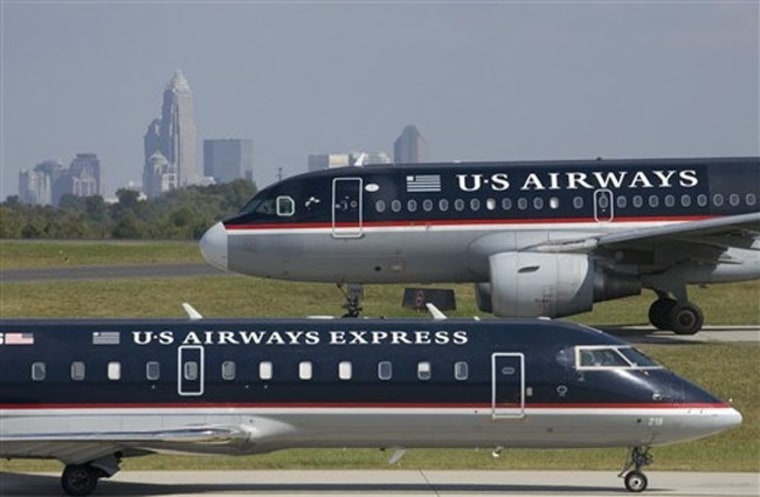Another day, another airline fee. Now it's US Airways charging for beverages and bottled water, starting today. And don't forget Hawaiian Air and Northwest joining United, American and US Airways in charging $15 for checking the first bag. Oh, and Delta doubled its fee for checking a second bag to $50.
What next? Fees for taking a deep breath? For looking out the window? For crossing your legs? Oh, I forgot — there’s not enough room to cross your legs.
Airlines are hurting, to be sure, and that’s why they’re tacking on all these extra fees. U.S. domestic carriers are losing billions, thanks chiefly to sky-high fuel prices. And while oil has dropped from $147 for a barrel of crude petroleum a few weeks ago to about $127 a barrel now, that’s not nearly enough to put the airlines back in the black.
Analysts generally agree that oil will have to plummet to $70 to $80 per barrel for most airlines to make money, and no one knows when or if that will happen.
So, airlines nickel-and-dime their customers instead. Together with flight delays and cancellations and packed airports and airplanes, the new fees are creating the summer of our discontent.
Here is a modest proposal for U.S. carriers: Raise fares. Seriously. Raise them enough to cover expenses — most experts think about 20 percent would be enough — and end the egregious fees.
Of course, U.S. carriers have raised fares about a dozen times just since the beginning of this year. But those increases — which generated a 4.4 percent average fare rise in the first quarter of 2008 from a year ago, according to the Department of Transportation — are incremental: $10 here, $20 there. They haven’t kept pace with soaring airline expenses.
One major airline has avoided what some industry insiders coyly call “à la carte’’ pricing, “bespoke’’ pricing and the like: Southwest Airlines. The discount pioneer has raised fares. It does not charge for checked bags, soft drinks or levy a fuel surcharge. That’s one reason for Southwest’s enviably high customer satisfaction ratings.
Southwest is an imperfect model. It has remained consistently profitable, if less so lately, in part because it locks in fuel purchases at lower prices through hedging. Because Southwest is one of the world's highest-market-value airlines, and it flies more U.S. domestic passengers than any other carrier, it has clout with fuel producers.
But here’s another point: Southwest’s clout comes about because of its commercial success, and its success comes about because it is an unusually well-managed company in a dysfunctional business.
Airlines should raise their fares, à la Southwest, in lieu of adding fees. Will there be push-back from air travelers? Yes. No one likes paying higher fares. But being nickel-and-dimed to distraction is worse.
In the meantime, if oil prices continue to decline, airlines should peel away niggling fees. Air travelers are alienated right now, and a fee roll-back would be one concrete way for airlines to demonstrate good will to the people who keep them aloft.
